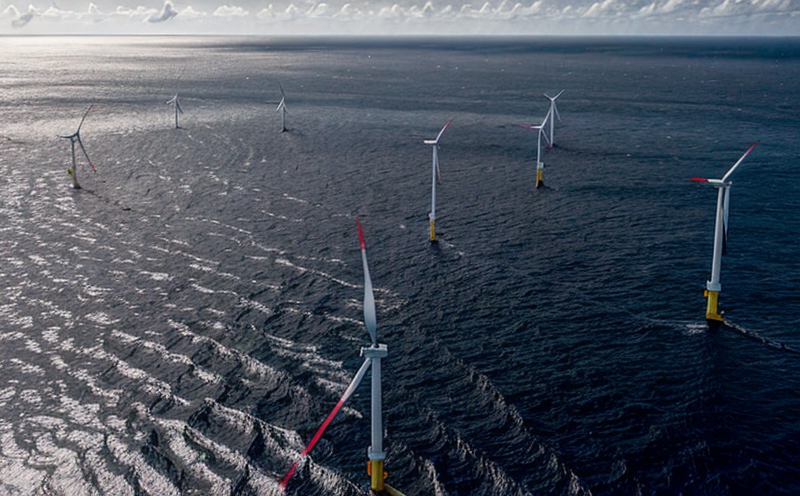ISO 14694 Acoustic Noise Testing of Wind Farms
The ISO 14694 standard provides a framework for measuring and evaluating the acoustic noise levels produced by wind farms. This testing is crucial in ensuring that wind turbines operate within acceptable noise limits, thereby minimizing disturbance to nearby communities and wildlife.
Wind turbines are subject to stringent regulations regarding their acoustic emissions due to the potential impacts on human health and the environment. ISO 14694 specifies methods for measuring sound pressure levels at various distances from the wind farm. These measurements help operators and regulatory bodies assess whether the noise generated by the turbines meets local, national, and international standards.
The testing process involves placing acoustic sensors around the perimeter of the wind farm to capture sound pressure levels at different points. The sensors must be calibrated according to ISO 14694 guidelines to ensure accuracy and consistency. After data collection, the results are analyzed using statistical methods that comply with the standard’s requirements.
One critical aspect of this testing is understanding how wind speed and direction affect sound propagation. Variations in these factors can significantly influence the perceived noise levels by nearby residents. Therefore, real-world conditions are taken into account during data interpretation to provide accurate assessments.
The importance of ISO 14694 testing extends beyond compliance; it also plays a vital role in R&D efforts aimed at improving wind turbine design and efficiency. By continuously monitoring acoustic emissions, engineers can identify areas for improvement that could lead to quieter and more efficient turbines.
Another key benefit is the ability to predict potential environmental impacts before construction begins. This proactive approach allows developers to make informed decisions about site selection and turbine placement, reducing the risk of future disputes with local stakeholders.
The testing process requires a combination of precision instruments and trained personnel to ensure reliable data collection. At Eurolab, we employ state-of-the-art equipment that meets or exceeds ISO 14694 specifications. Our team of experts ensures that every aspect of the testing is conducted rigorously, from sensor placement to final analysis.
In summary, ISO 14694 acoustic noise testing is an essential part of wind farm management and development. It not only ensures compliance with regulatory requirements but also contributes to sustainable practices by promoting quieter and more environmentally friendly energy generation.
Eurolab Advantages
At Eurolab, we pride ourselves on offering unparalleled expertise in ISO 14694 acoustic noise testing. Our advanced facilities and experienced staff provide clients with a comprehensive suite of services tailored to meet the unique needs of wind farm operators.
We have dedicated laboratories specifically equipped for this type of testing, ensuring that all equipment is precisely calibrated according to international standards. This precision guarantees accurate data collection, which is crucial for reliable analysis and interpretation.
Our team of professionals includes engineers specializing in acoustics, environmental science, and wind energy systems. They bring a wealth of knowledge and experience to each project, enabling us to deliver high-quality results consistently.
We understand the importance of turnaround time when conducting tests critical for regulatory compliance or R&D purposes. Therefore, we strive to complete projects efficiently without compromising on quality. Our streamlined processes allow us to provide timely reports that can inform decision-making promptly.
Customer satisfaction is at the heart of what Eurolab stands for. We maintain excellent relationships with our clients by offering transparent communication throughout each project and addressing any concerns proactively. Feedback from satisfied customers underscores our commitment to excellence in every aspect of our services.
Customer Impact and Satisfaction
The success stories of Eurolab's ISO 14694 acoustic noise testing are numerous, reflecting the significant impact we have on wind farm operations. By ensuring compliance with stringent standards, our clients can proceed confidently knowing that their projects adhere to all necessary regulations.
For quality managers and compliance officers, peace of mind comes from knowing that every step in the testing process adheres strictly to ISO 14694 guidelines. This reduces the risk of non-compliance issues down the line, saving time and resources on potential fines or delays.
R&D engineers benefit greatly from our detailed reports, which provide valuable insights into current performance metrics of wind turbines. These data points can guide further innovations in design and operational enhancements, ultimately leading to quieter and more efficient systems.
For procurement teams involved in selecting the right equipment for new installations or upgrades, Eurolab's expertise ensures they make informed decisions based on real-world testing results rather than theoretical specifications alone.
The positive feedback we receive from satisfied customers speaks volumes about our commitment to delivering top-notch services. Many have praised not only the accuracy of our test results but also the friendly and professional manner in which these are delivered.
Environmental and Sustainability Contributions
The environmental benefits of ISO 14694 acoustic noise testing extend far beyond compliance with regulations. By conducting thorough assessments, we contribute significantly to maintaining a sustainable balance between energy production and natural habitats.
The data collected through these tests helps identify areas where improvements can be made in reducing noise pollution around wind farms. This reduction has direct positive impacts on wildlife living close by, enhancing their quality of life without compromising human health or safety.
Moreover, the insights gained from our testing contribute to ongoing research into quieter turbine designs and operational strategies that minimize disturbance. Such advancements play a crucial role in advancing renewable energy technologies towards greater sustainability goals.
By adhering strictly to ISO 14694 standards, we uphold high ethical practices within the industry. Our commitment to environmental responsibility reflects our dedication to creating a greener future through sustainable practices.





